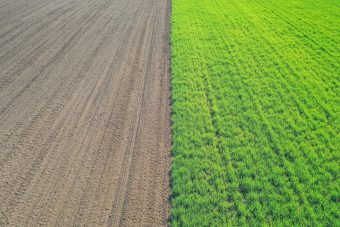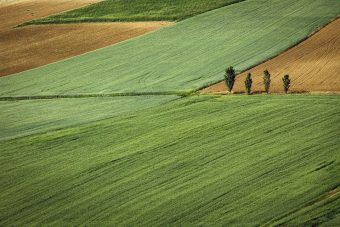Pesticides in fruits and vegetables, mercury in tuna, heavy metals in potatoes or dark chocolate – these are just some of the examples that in the past made us wonder what kind of food is produced not only in Serbia, but in the whole world and what we can do let’s protect water, air and land from pollution. Experts say that soil pollution in our country is a serious problem, but that it is still favorable for the production of healthy food.
Soil pollution is a consequence of industrial activity, urbanization, intensive agriculture and inadequate waste management. Much more developed countries than Serbia are also facing this problem.
Major soil pollutants are heavy metals, the most dangerous of which are lead, cadmium, mercury and arsenic. Pesticides, nitrates and phosphates, organic pollutants, plastics, wastewater and sludge are no less dangerous.
„Contaminated soil poses a risk to agricultural production and can be dangerous to human health. Increased introduction of heavy metals and pesticides into the food chain can lead to the accumulation of toxins in the body of people and animals, with risks of various chronic diseases.warns prof. Dr. Aleksandar Đorđević, Head of the Department of Pedology and Geology at the Faculty of Agriculture.
How the land in Serbia is polluted by region
Depending on the region, soil pollution also differs. In the vicinity of Bor and Majdanpek, experts say, the mining and metallurgical industries leave significant amounts of heavy metals in the soil. In addition, mining activities have contributed to the degradation of land and surrounding ecosystems.
„There are serious chemical industries in Pančevo and Kraljevo, so this region has high concentrations of pollutants, including heavy metals and organic pollutants, as well as inadequate waste management,” explains the RTS interlocutor.
„The capital of Serbia faces problems of land pollution due to urban expansion, improper waste management, as well as the use of pesticides in urban and suburban agricultural areas.adds Đorđević, noting that the risk of pesticide pollution also exists in Vojvodina and other areas with intensive agricultural production.
Southeastern European countries, he says, face high levels of soil pollution, while the situation in Western European countries is somewhat better.
It is estimated that between 60 and 70 percent of European agricultural land cannot be labeled as healthy, mostly due to loss of humus and erosion.

At this time, it is very important that local farmers are supported in turning to regenerative practices that will improve the land.
„This transition requires larger initial investments, new mechanization, more knowledge and a more complex organization of production, and the results will be visible only in a future period. It is clear that farmers need institutional, professional and financial assistance for this. Land conservation is also important to us in cities because of its powerful water-thermal capacity, which can cool us down during tropical days and absorb water in case of heavy rainfall.”adds Ninkov.
In order to reduce land pollution in Serbia, serious investments in monitoring, rehabilitation of contaminated land and promotion of sustainable agricultural practices are needed. In EU countries, the Circular Economy Regulation in agriculture has been introduced.
„Greece, for example, recently adopted a new strategic plan for the common agricultural policy for the period from 2023 to 2027, which has a budget of 13.4 billion euros, with a special emphasis on environmental and climate goals. Farmers receive subsidies for the use of microbiological fertilizers and pesticides, the cultivation of legumes and cover crops, adapted land cultivation, all with the aim of maintaining soil fertility, preventing further degradation and obtaining health-safe food.explains Professor Đorđević.
Changing the habits of an individual can reduce soil pollution
Education and awareness of citizens about proper waste management and environmental protection are key to preserving land quality. As individuals we can contribute to less pollution of this resource. To begin with, we should waste less food.
„A third of the world’s produced food is thrown away. Think about how much land, water and energy is invested in that food and try to plan your meals better”says Ninkov.
Also, you should choose local products with less packaging, especially plastic, as well as those from sustainable production systems, thus supporting environmentally committed companies and producers.
„Our behavior is reflected on the shelves. What we choose and buy the most shapes the offer, so there will be more and more similar products, and thus we send a clear message to the companies that produce them. This is the right way to reduce pollution to the greatest extent. Recycling, as a true association of citizens with ecology, represents solving the consequence, not the cause of the problem”explains Ninkov.
Serbia has a Law on Land Protection, but the problem is compliance with the regulations
In 2015, Serbia passed the Law on Land Protection, making it the first in the region and beyond to establish regulations in this area. In our country, the Cadastre of contaminated land locations is maintained by the Environmental Protection Agency.

„In order to preserve the land, it is necessary to conduct wider and more detailed investigations of the quality of the land with permanent monitoring. Serbia has a significant number of experts gathered in the Serbian Society for the Study of Land, but their work needs to be further strengthened through national thematic projects dedicated to land, as the European Union has recognized and included among its priorities due to the exceptional importance of land.”adds our interlocutor.
Although we have had the law for nine years, compliance with the regulations is still a problem.
„Serbia has adopted certain European standards, however, implementation and supervision remain a challenge. Soil is the skin of the planet, and the twenty-first century is considered the century of soil conservation as a natural resource”Professor Đorđević reminds.
In the EU, he says, there are developed systems for monitoring land quality, while Serbia is still working on improving the capacity for monitoring and analyzing land conditions. The lack of data on land quality makes it difficult to make informed decisions about the protection and rehabilitation of this resource.
Source: RTS
Source: energetskiportal.rs


